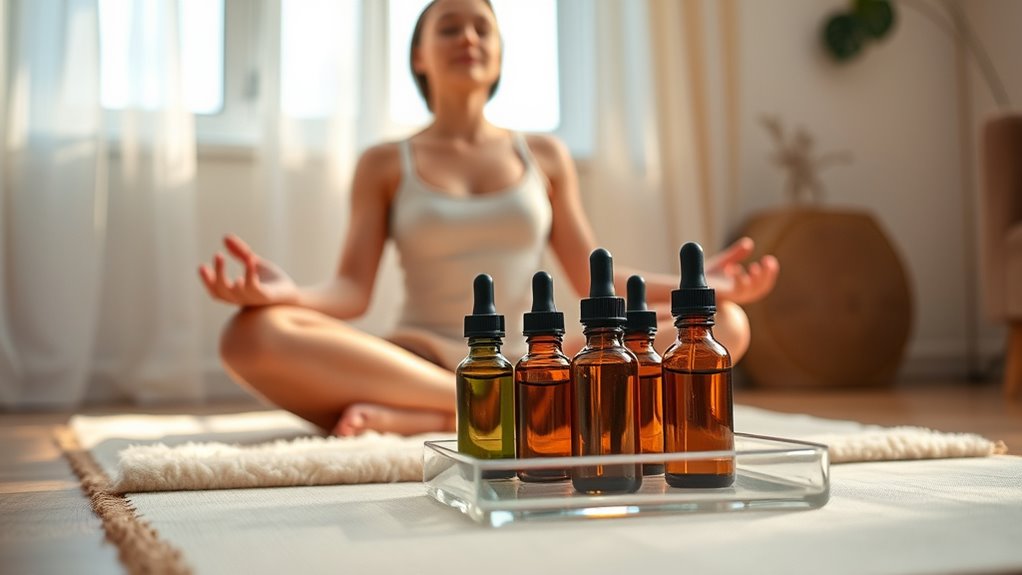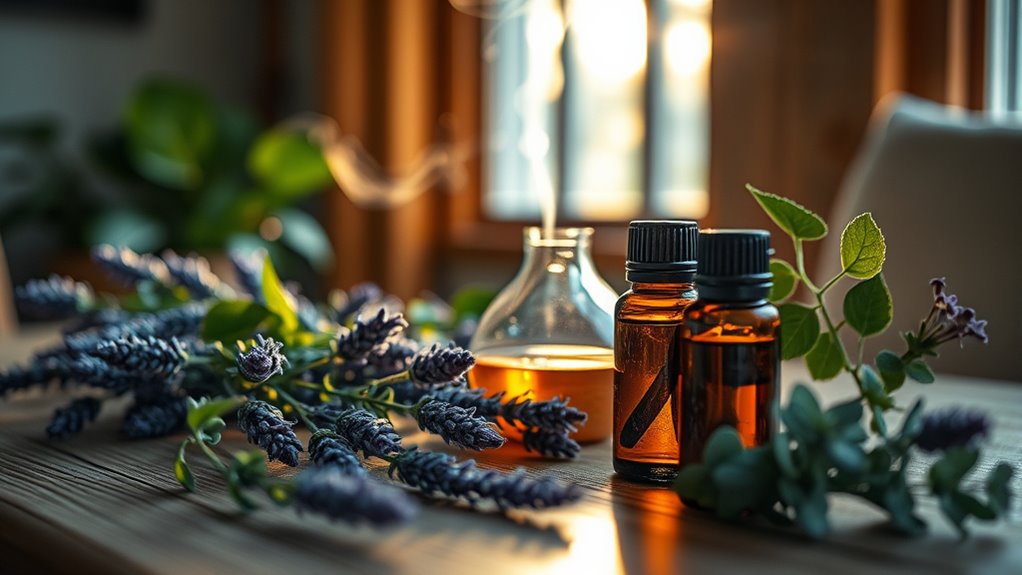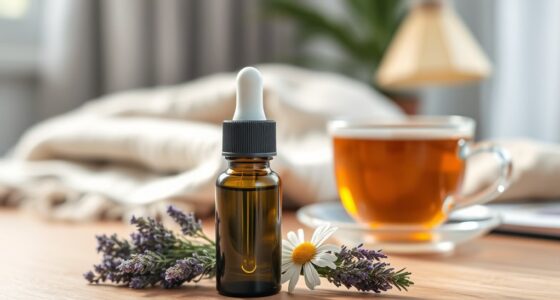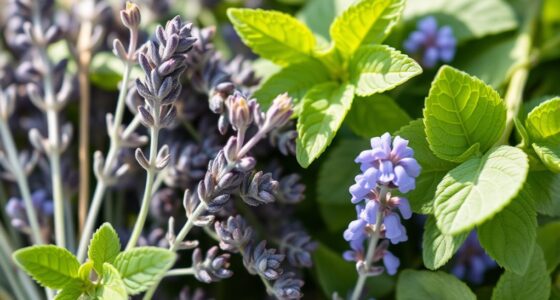Essential oils can help reduce anxiety by affecting your brain’s limbic system, which controls emotions and memories. Scents like lavender have scientific support for calming effects, especially when inhaled in a comfortable environment. However, results vary based on your scent preferences and the quality of oils used. While they’re not a cure, incorporating aromatherapy with other treatments may boost relaxation. Keep exploring to learn how to maximize their benefits safely.
Key Takeaways
- Scientific studies suggest inhaling certain essential oils, like lavender, can reduce cortisol levels and promote relaxation.
- Essential oils influence the limbic system, which controls emotions, potentially alleviating anxiety symptoms.
- Effectiveness varies based on individual preferences, oil quality, and environmental factors.
- Aromatherapy is a complementary approach, not a replacement for professional mental health treatment.
- Quality control and proper use are crucial for safety and maximizing potential calming benefits.

Many people turn to essential oils as a natural way to ease anxiety, seeking alternatives to medication or therapy. You might have heard about aromatherapy benefits and scent therapy as calming tools, but do they really work? The idea behind using essential oils for anxiety is that certain scents can influence your brain and emotions, promoting relaxation and reducing stress. When you inhale these fragrances, they travel through your nasal passages and interact with your limbic system, the part of your brain that controls emotions and memories. This is the basis for scent therapy’s potential to help soothe anxious feelings.
Research shows that some essential oils, like lavender, have calming properties, which is why they’re often associated with anxiety relief. Aromatherapy benefits aren’t solely based on tradition or anecdotal evidence; scientific studies suggest that inhaling specific scents can lower cortisol levels, your body’s main stress hormone. When you use essential oils in diffusers, sprays, or even during massage, you’re engaging in a form of scent therapy that has the potential to create a more relaxed mental state. Many users report feeling calmer and more centered, particularly when they incorporate essential oils into their daily routines. Additionally, quality control standards for essential oils play a crucial role in ensuring their safety and effectiveness. However, it’s important to understand that aromatherapy isn’t a cure-all; it’s best used as a complementary approach alongside other treatments.
You might wonder how effective scent therapy really is. While some scientific studies support the idea that essential oils can reduce anxiety, results vary from person to person. Factors like individual scent preferences, the quality of the oils, and the context of use all influence outcomes. For example, inhaling lavender oil in a quiet, comfortable space may be more effective than in a busy environment. Also, the psychological aspect plays a role—if you believe that a certain scent will help, that belief alone can enhance its calming effects. Remember, essential oils are not a substitute for professional mental health care, but they can be a helpful addition to your anxiety management toolkit.
Frequently Asked Questions
Are Essential Oils Safe for Children With Anxiety?
You might wonder if essential oils are safe for children with anxiety. It’s important to take safety precautions because some oils can cause child sensitivity or irritation. Always dilute oils properly and use kid-friendly options. Consult with a healthcare professional before use, especially for young children, and monitor their reactions closely. Being cautious helps ensure you support their well-being safely while exploring the potential calming benefits of essential oils.
How Long Does It Take for Essential Oils to Work?
Imagine diffusing lavender oil in your room before bed; you might notice calming effects within 15 to 30 minutes. The time it takes for essential oils to work depends on diffusion methods and application techniques. For instance, inhaling through diffusion or applying topically may produce quicker results, while longer exposure can deepen relaxation. Typically, you should give it at least 15-30 minutes to feel the calming effects.
Can Essential Oils Replace Traditional Anxiety Medications?
You shouldn’t see essential oils as a replacement for traditional anxiety medications. While aromatherapy benefits and alternative therapies can support your overall well-being, they aren’t a substitute for professional treatment. Using essential oils may help reduce stress and promote relaxation, but for serious anxiety, you need to consult a healthcare provider. Combining these methods can be helpful, yet medication and therapy remain essential for managing anxiety effectively.
Which Essential Oils Are Best for Severe Anxiety?
You might find that certain essential oils, like lavender, chamomile, and bergamot, are especially soothing for severe anxiety. Using aromatherapy techniques with these essential oil blends can create a calming environment. While they may not replace medication, incorporating them into your routine can offer gentle relief. Experiment with different blends and inhalation methods to discover what resonates best, helping you feel more centered and relaxed in challenging moments.
Are There Any Side Effects From Using Essential Oils?
You might wonder if using essential oils for scent therapy has side effects. While many find aromatherapy safe, it’s important to consider aromatherapy safety, as some oils can cause skin irritation or allergic reactions if not diluted properly. Always do a patch test before applying oils to your skin and consult a professional if you’re pregnant or have health concerns. Responsible use ensures you enjoy the benefits safely.
Conclusion
While essential oils might not be a magic fix, they can gently whisper comfort during anxious moments. Think of them as a soft breeze that eases your mind’s storm, offering a delicate moment of calm. As you explore their scent, you might find a subtle shift in your mood—a gentle nudge toward serenity. Remember, these aromatic allies are just one part of your journey toward peace, guiding you softly along the way.










